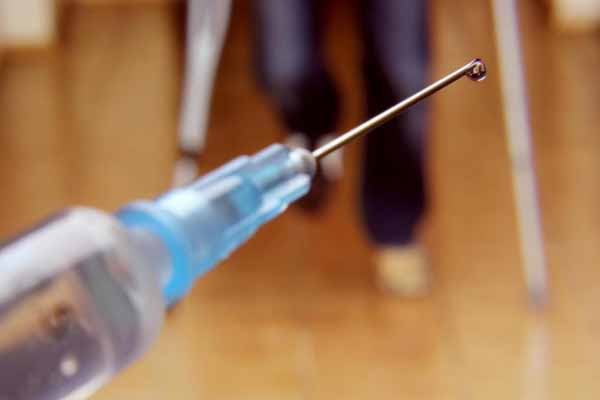
After federal health authorities green-lit Pfizer’s pediatric COVID-19 vaccine for children aged 5 to 11 in late 2021, early state data suggest Texas parents need some convincing that the shot is right for their children. And Texas physicians say some of their colleagues need a little convincing of a different kind – namely to become vaccinators themselves.
As of Jan. 10, Texas Department of State Health Service (DSHS) figures show more than 661,000 Texans aged 5 to 11 have received at least one dose of the vaccine. That’s about 23% of the state’s estimated population for that age group (using 2019 DSHS population estimates). Only about 370,000 children aged 5 to 11 are fully vaccinated, a little under 13%.
With medicine now in the midst of a surge in the omicron variant of COVID-19 – and assessing the impact the variant is having on children – the Texas Medical Association is urging pediatricians to become COVID-19 vaccinators and reinforce to parents the importance of vaccinating their children.
“The delta variant resulted in a much greater number of children seriously ill who required hospitalization. The value proposition is certainly there to get them vaccinated,” Keller pediatrician Jason Terk, MD, a past chair of TMA’s Council on Legislation and current chair of the Texas Public Health Coalition, said in December. “If we can do that in the medical home, where we can have that conversation at the point of care with our families, we’re going to be much more effective in protecting our patients.”
Frisco pediatrician Seth Kaplan, MD, immediate past president of the Texas Pediatric Society (TPS), told Texas Medicine Today several factors are driving slow vaccine uptake among the youngest children now eligible for the shots. One major one is that there just aren’t enough places to get the vaccine.
“The delivery pipeline, both from a practice and a pharmacy standpoint, isn’t what necessarily we thought it was going to be,” and many pediatric practices, stressed and stretched thin, have been reluctant to enroll as vaccinators, he said.
“The availability piece is a big aspect of it, and we’re actually looking at that at TPS right now, looking at what the roadblocks are with practices signing up,” Dr. Kaplan said. “Unfortunately, because the process is so different than the usual process for obtaining vaccines and requires so much information to sign up, a lot of practices have just decided that it’s not worth the hassle, especially at a time when we’re already the busiest we’ve been in 10 years. Because we’re seeing all of our well visits, we’re seeing all of the mental health and behavioral health visits, and for the first time in a long time, we’re seeing lot of sick visit volume, because the usual pediatric illnesses are spreading, and almost everybody who’s sick needs a COVID test.”
To physicians reluctant to enroll, Dr. Kaplan says he understands their concerns. But he says DSHS offers a great deal of help in doing so, and the rewards of navigating it include a huge sense of appreciation from families.
“We’ve heard the words ‘thank you’ in the office more in the last couple weeks than we have in a long, long time,” he said of his practice, TLC Pediatrics of Frisco. “There’s an untold benefit of [becoming a vaccinator] and building that relationship with your families that just binds them to your practice even more.”
At the beginning of distribution of the COVID-19 vaccine to the larger public, Dr. Terk said, participating as a vaccinator carried some logistical and administrative challenges, and perceptions of those difficulties have persisted, driving physician reluctance. But the process has become more efficient over time.
“We have found the process of becoming a provider for COVID-19 vaccinations to be a lot more streamlined, and it’s fairly easy now to get a sense of how long it takes from the time you order the vaccine to when you may get it. So, it’s just a matter of planning ahead,” he said. “We found the process to be manageable and doable, and certainly not a barrier.”
Among other reasons for the low early vaccination uptake for 5- to 11-year-old patients, Dr. Kaplan cites “a certain subset” of parents who got vaccinated themselves and may not have had a problem vaccinating their older teens, but are hesitant to let such young children get the shot.
“I spend a lot of time talking about the fact that the number of side effects for the vaccine is actually exceedingly low in this age group and exceedingly rare, [and] that the risk of COVID is far greater than the risk of the vaccine,” he said. “Getting that message to sink in has been tough. But we have a lot of those conversations, and some people will buy those answers, but for most of them, they’re really just taking a long time to think about it.”
Even for practices that are unable to offer vaccines in their office, “[it’s important] to make sure they’re still having the conversation and keeping open lines of communication and meeting families where they’re at, and understanding that they’ve got a lot of questions with what’s in the news and what’s on social media,” Dr. Kaplan added. “It’s that much more important for us to listen, heed their concerns, and provide them with the best information we possibly can.”
Along with the DSHS Vaccine Provider Enrollment page, TMA resources can help you integrate COVID-19 vaccines into your practice. Check out TMA’s Best Practices documents for planning and operating COVID-19 vaccine clinics.